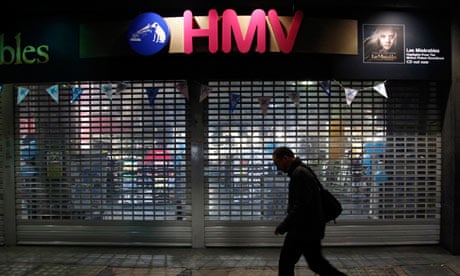The chief executive of HMV, Trevor Moore, has given an impassioned defence of the chain, which will formally slide into administration on Tuesday, insisting it still deserves a place on Britain's high streets.
"Ian [Kenyon, HMV's finance director] and I are really passionate about working with the business," said Moore, the former Jessops boss who joined HMV in September. "I would very much like to be involved … if the opportunity presents itself.
"HMV was recently voted one of the top 10 names people most wanted on their high street … A high street without HMV is not as attractive as it is with one. We know our customers feel the same way."
Moore repeatedly thanked suppliers for having been supportive, despite the failure in recent weeks of the group's major creditors – banks, landlords, film houses and record labels – to agree revised terms that would keep HMV afloat.
Large suppliers, such as Universal, have fought to keep HMV trading over the past 12 months, striking a confidential deal with the retailer which saw them take a stake in the business in exchange for favourable supply terms. Through its ownership of EMI, once the parent group of HMV, Universal may see leases on about 40 stores revert to its ownership.
With multiple financial interests in HMV's future, therefore, Universal is likely to emerge as a potential bidder for at least parts of the high street business. Turnaround company Hilco, which acquired HMV's Canadian operations, may also take an interest.
Meanwhile, the group's underperforming website will almost certainly be in the sights of the fast-growing online firm The Hut Group, which snapped up online rights to the Zavvi brand when the retailer went bust in 2009. The Hut, which is preparing to float later this year, has discontinued sales of music CDs, but remains a major player in DVDs and games.
In a press call on Tuesday afternoon Kenyon said comparable sales over the Christmas trading period had not changed. At the last update, like-for-like sales were down 10.2% for the half year to 27 October.
The 250-strong chain is the latest casualty of the shift to online shopping, putting 4,500 jobs at risk. Stores opened on Tuesday but the firm said it would not be accepting gift vouchers or issuing any more.
HMV held discussions with its banks over the weekend but failed to agree on new terms for its debt. It said in a statement: "The board regrets to announce that it has been unable to reach a position where it feels able to continue to trade outside of insolvency protection and in the circumstances therefore intends to file notice to appoint administrators to the company and certain of its subsidiaries with immediate effect."
Nick Edwards, Neville Kahn and Rob Harding of Deloitte will be appointed as administrators. The company said: "The directors understand that it is the intention of the administrators, once appointed, to continue to trade while they seek a purchaser for the business."
As the reaction to HMV's demise has shown, the brand, famous for its Nipper the dog trademark, still holds a cachet for many people. HMV had about 35% of the, albeit dwindling, CD market in 2012 and it is thought that around half of its 240 stores could be profitable once the company gets rid of its debt.
Neil Saunders, the managing director of the research house Conlumino, said: "The brand certainly has some value, however, while someone could arguably turn a profit in running some of the stores for a period of time they would still be betting against the future. By our own figures, we forecast that by the end of 2015 some 90.4% of music and film sales will be online. The bottom line is that there is no real future for physical retail in the music sector."
The news prompted many to mourn the demise of the 91-year-old chain. Chuka Umunna MP, Labour's shadow business secretary, said: "HMV is a national institution that has been a feature of our high streets for over 90 years so this news is deeply worrying. For the sake of HMV's employees, we hope a way can be found to keep the business going. The demise of HMV – a national institution – would be a sad loss for British retail."
Twitter also saw an outpouring of emotion from fans of the store, with comments such as: "HMV closing is the worst thing that's ever happened to me."
But analysts were philosophical about the chain's collapse. Saunders said: "This outcome was always inevitable. While many failures of recent times have been, at least in part, driven by the economy, HMV's reported demise is a structural failure. In the digital era where 73.4% of music and film are downloaded or bought online, HMV's business model has simply become increasingly irrelevant and unsustainable.
"HMV did not react early enough to the digital trend; it did not give shoppers a reason to keep buying from it. Admittedly, the company has tried to innovate through selling more electricals and gadgets but, unfortunately, these initiatives were never going to be enough to counteract the terminal decline in its core business."






Comments (…)
Sign in or create your Guardian account to join the discussion